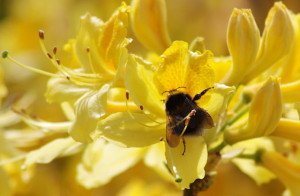
A new comprehensive study, published in Science, tracks the impact of climate change on bumblebees, finding global warming is rapidly shrinking the area where these bees are found in both North America and Europe.
Researchers examined more than 420,000 historical and current Northern Hemisphere records of many species of bumblebees–and confirm that the critical pollinators are in steep decline at a continental scale because of climate change.
Our colleagues at the UK SMC collected the following expert commentary.
Dr Aldina Franco, School of Environmental Sciences, University of East Anglia, said:
“Similarly to what is happening to habitat specialist butterflies, bumblebees are contracting their ranges, disappearing from sites at the warm range margin and not being able to colonise new areas at the cooler range margin of their distributions. Bumblebees are important species because they are pollinators and provide important ecosystem services for humans. There is a pressing need to identify strategies to prevent the joint detrimental effects of climate change and habitat fragmentation on biodiversity to guarantee that our essential pollinators can thrive.”
Dr Nathalie Pettorelli, Research Fellow, Zoological Society of London (ZSL), said:
“I believe this macroecological study is robust – and triggers a new set of questions in terms of wildlife’s response to climate change. I think it’s important to remember that this type of correlative approach is aimed at unveiling large scale patterns in species’ response to climate change, and that it needs to be followed by new process-based research.
“Kerr et al show that bumblebees generally fail to track warming in both Europe and North America: the next step is to understand why. Without this knowledge, efficient mitigation strategies are difficult to identify. I would also add that there seem to be some interesting level of variation in bumblebee species’ response to changes in climatic conditions, something that isn’t discussed in the paper. This level of inter-specific variability might be important to consider when thinking about mitigation strategies, as one solution might not fit all.”
Mr Norman Carreck, Science Director, International Bee Research Association, University of Sussex, said:
“Hitherto, I think among the many other factors that are believed to contribute to the decline of pollinator populations, scientists have been fairly relaxed about the effects of climate change, arguing that since pollinators can fly, if confronted by changing and hostile conditions, they would simply move to more suitable conditions, perhaps shifting northwards. However, this paper reveals that the true picture is more complex, and that this does not appear to be happening. Being temperate species, bumble bees are especially vulnerable to increased temperatures. This is thus an important paper, which highlights areas for future research.”
Prof David Goulson, Professor of Biology (Evolution, Behaviour and Environment), University of Sussex, said:
“This study looks to be solid, based as it is on a huge data set. The results aren’t entirely surprising – we know that bumblebees thrive in cool climates, so we’d expect them to be adversely impacted by climate change, particularly in the southern margins of their range, but nonetheless this is the first clear evidence that this is happening across many species and across huge geographic scales. What is more surprising is that they do not seem to be expanding northwards, perhaps because suitable habitat is not available to the north of their existing ranges.
“Previously, attention on bee declines has focussed on habitat loss, pesticide use and the spread of bee parasites. This study shows that a different factor – climate change – is also beginning to take its toll. Taking this study together with previous evidence suggests it is likely that the combined stresses from all of these pressures will have devastating impacts on bumblebees in the not-too-distant future.
“The paper suggests that northward translocations of bumblebees may help – I am not convinced by this, since bumblebees are pretty mobile creatures – I think it is likely that they could move northwards on their own if suitable habitat were available to move in to.”
Professor Nigel Raine, Rebanks Family Chair in Pollinator Conservation at the University of Guelph in Canada, said:
“Bumblebees are critical pollinators of many crops and wild flowers, so it is very concerning that they are struggling to adapt to climate change around the world. We urgently need to understand how other pollinators critical for fruit and vegetable production are being affected by climate change.”
“Climate change appears to be driving the ranges of most species towards the poles. Bumblebees don’t seem to be responding in the same way – instead of simply moving northwards the areas of land occupied by these pollinators are shrinking as they lose ground on the southern-most edges of their range. If these patterns don’t change it’s a question of when, not if, we lose these charismatic and essential bees.”